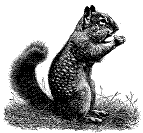Vertebrate Pest Conference: Proceedings

Vertebrate Pest Conference Proceedings: 12th (1986)
Date of this Version
March 1986
Document Type
Article
Abstract
Red squill has been used in rodent control for several hundred years but in the United States its use has decreased since the 1950s. However, there is now a recognized need for rodenticides with different kinds of toxic activity. Red squill is being investigated as an acute rodenticide and an economic crop for the southwestern states. Clones from a prior USDA collection have been assayed by high-performance liquid chromatography and selections are being propagated in California and Arizona. The major toxicant, scilliroside, is relatively fast acting, causing convulsions and death to rats and mice. This glycoside is also strongly emetic to humans, cats and dogs, affording a safety factor uncommon to high-toxicity rodenticides. Our chemical, processing, agronomic, and toxicological studies are a technical basis for further developing this potentially superior rodenticide.

